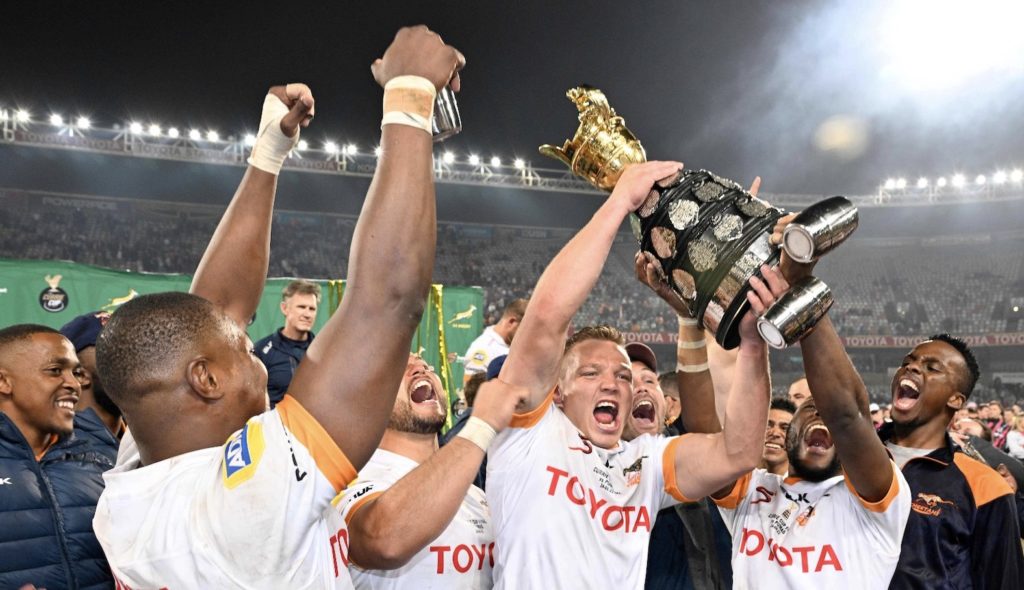SA Rugby must make the Currie Cup an eight-week tournament that doesn’t clash with the Vodacom URC, writes SIMON BORCHARDT.
I’ve made peace with the fact that the Currie Cup will never again be the competition I grew up watching.
The 1995 tournament will always stand out for me. Taking place in the warm afterglow of the Springboks’ World Cup win, six full-strength provincial teams – including all the Boks – played fiercely competitive home and away matches against each other, before the top two on the log progressed to the final.
Natal beat Western Province 25-17 in front of a capacity crowd at Kings Park – despite the wet weather – and Gary Teichmann lifted the famous golden trophy. He did so again a year later after his side beat Transvaal in another enthralling, full-strength final at a packed Ellis Park.
Those days are long gone. The Springboks haven’t featured in the Currie Cup at all for years, while South Africa’s URC franchises rightly prioritise that competition and the Champions/Challenge Cup.
With those tournaments clashing with the Currie Cup, the Bulls, Lions, Sharks and Western Province are often forced to play B or C teams at domestic level, so no one should have been surprised when Griquas and the Pumas met in the 2022 final, or when the Cheetahs and Pumas contested the 2023 decider.
Earlier this year, SA Rugby formed a committee to make recommendations to its general council about the way forward for the Currie Cup. They’ve basically got two options – leave things as they are and the Currie Cup continues to be a low-interest development tournament akin to the old Vodacom Cup, or enable the Currie Cup to become a better competition that more people want to watch.
To achieve the latter, SA Rugby must give the eight-team Currie Cup its own slot in the rugby calendar so that it doesn’t clash with the URC.
The simplest way to do this is to start the Currie Cup straight after the URC, with a single round of league matches followed by a final (no semi-finals). That eight-week tournament could be played in June and July, and with the URC only starting in mid-September, non-Springbok URC players would be available for most of the Currie Cup (depending on their season workloads).
Bulls president Willem Strauss told Rapport newspaper that ‘in an ideal world, a Currie Cup over a single round of matches would be the desired solution for the URC teams, but then one does a disservice to teams like the Cheetahs, Griquas and Pumas. You don’t want that.’
Those three teams (and no doubt the Griffons, too) want a double round of Currie Cup matches to give them a guaranteed 14 games a year, which is understandable. However, those additional seven fixtures could be found for them in another tournament played during the URC.
That tournament could be the Mzansi Challenge, which SA Rugby created this past season to provide the six First Division teams with more matches.
It got off to a rocky start with the controversial withdrawal of the Tel Aviv Heat’s invitation and there was more negative press when local teams objected to the San Clemente Rhinos’ decision to select up to 18 players from Pretoria club Naka Bulls in their match 23. But the Zimbabwean Goshawks, Kenyan Simbas and Namibia’s Welwitschias did bring something different to the local scene, and the Valke were given an opportunity to win their first silverware in 17 years.
SA Rugby may be considering scrapping the Mzansi Challenge after the challenges it presented, but I’d urge them to expand it. Bring in the Cheetahs, Pumas, Griquas and Griffons, and perhaps another, stronger, foreign team, like the Pampas who won the Vodacom Cup back in 2011. Each team would play each other once, with the top four qualifying for the semi-finals.
The Mzansi Challenge would run concurrently with the URC and be followed by a higher-quality Currie Cup that wouldn’t compete with any other club/franchise rugby during a two-month period.
SA Rugby has a golden opportunity to get its season structure right, once and for all, and restore some prestige to the Currie Cup in the process.
And if it doesn’t?
‘The Currie Cup will just be watered down more and more and die a quiet death,’ warned Sharks CEO Eduard Coetzee.
Photo: @CheetahsRugby/Twitter





